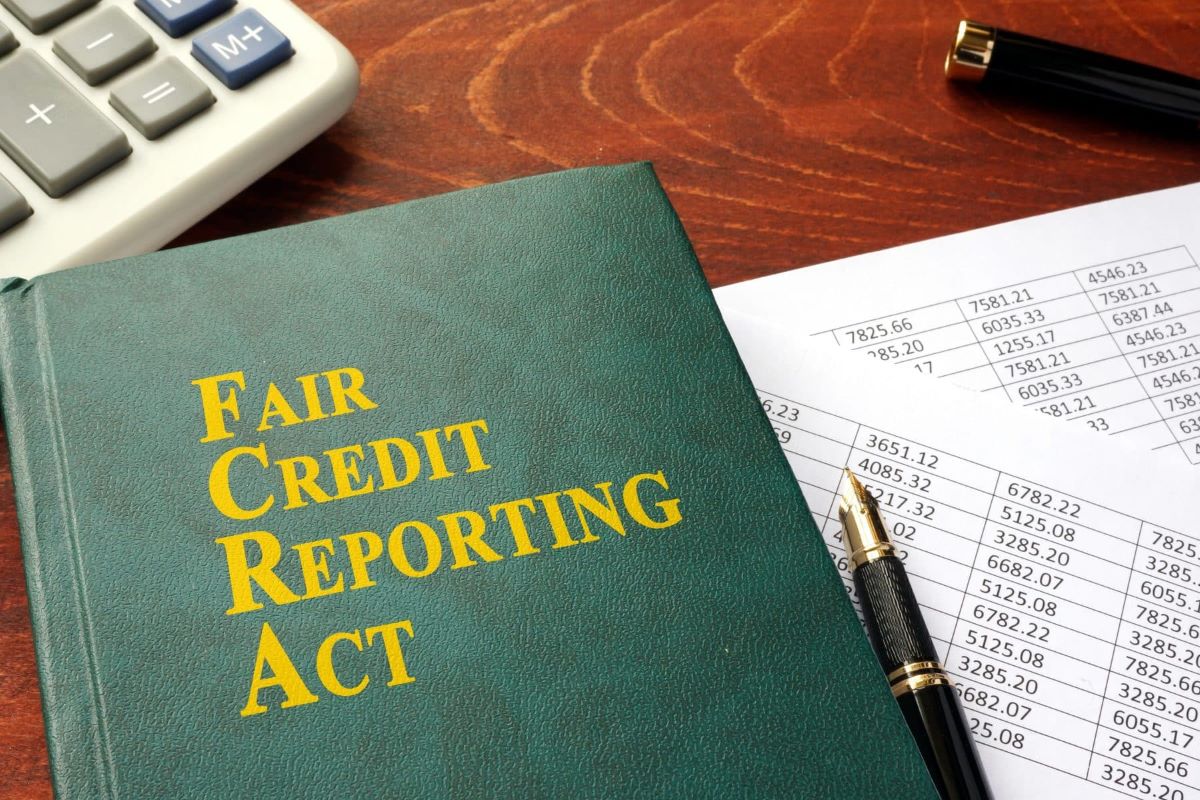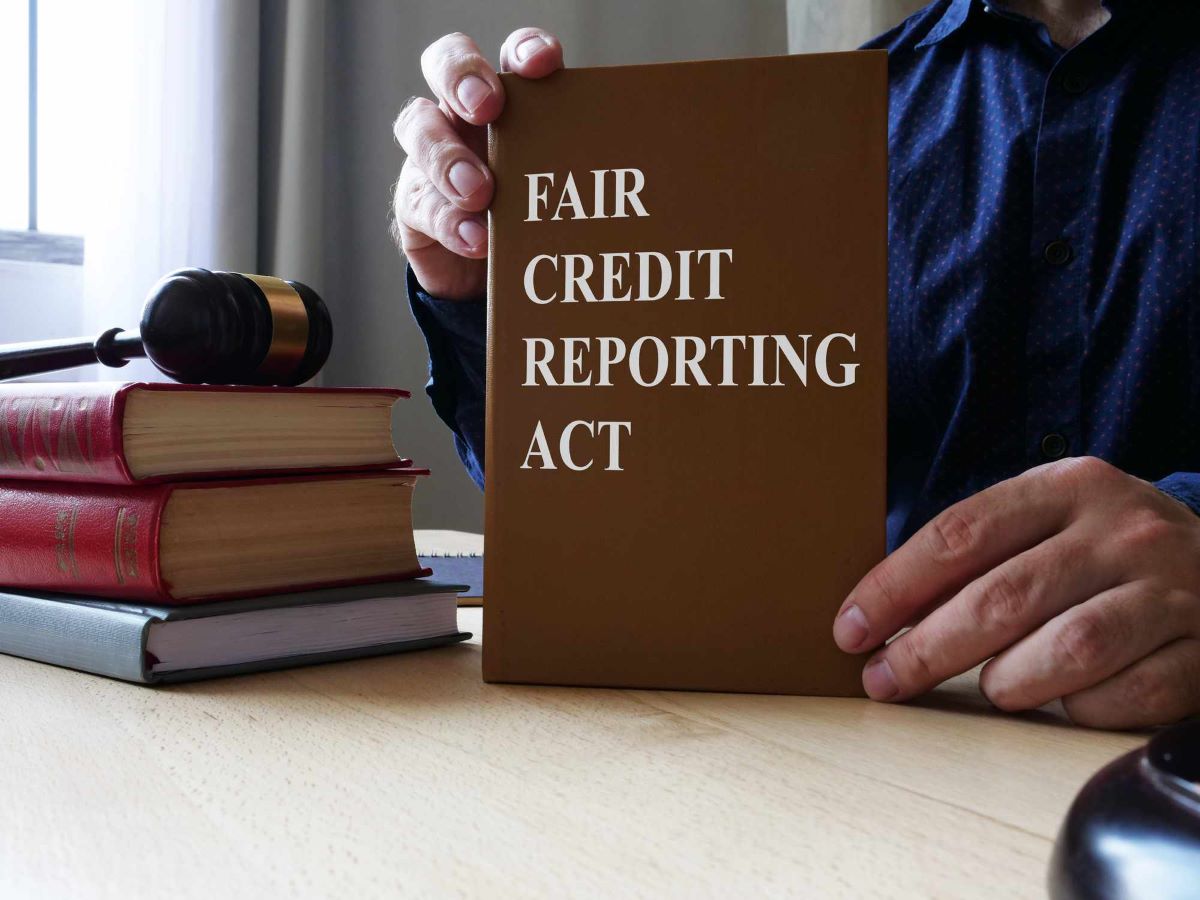Home>Finance>What Problem Was The Fair Credit Reporting Act (FCRA) Designed To Solve?


Finance
What Problem Was The Fair Credit Reporting Act (FCRA) Designed To Solve?
Published: January 11, 2024
The Fair Credit Reporting Act (FCRA) was designed to address issues related to financial information and protect consumers from inaccurate credit reporting.
(Many of the links in this article redirect to a specific reviewed product. Your purchase of these products through affiliate links helps to generate commission for LiveWell, at no extra cost. Learn more)
Table of Contents
Introduction
The Fair Credit Reporting Act (FCRA) is a federal law enacted in the United States in 1970 with the objective of protecting consumers’ rights and regulating the practices of credit reporting agencies. The FCRA addresses various issues related to the fairness, accuracy, and privacy of consumer credit information. It aims to ensure that individuals have access to accurate credit reports, have control over the collection and use of their credit information, and have the ability to correct any inaccuracies in their credit reports.
The FCRA was designed to address the growing concerns regarding the reliability and misuse of consumer credit information. Prior to its enactment, there were no specific regulations governing the collection, maintenance, and dissemination of credit information. This lack of oversight led to numerous cases of incorrect, outdated, and misleading credit reports, which often resulted in unfair treatment of consumers by lenders, employers, and insurance companies.
The FCRA was a significant step towards establishing a fair and transparent credit reporting system. It introduced a set of guidelines and obligations for credit reporting agencies, creditors, and consumers. The law not only provided consumers with the right to access and dispute their credit information but also required credit reporting agencies to maintain accurate and complete records.
Over the years, the FCRA has undergone revisions and amendments to adapt to the changing landscape of the credit reporting industry. The rapid advancement of technology and the growing importance of credit in various aspects of people’s lives necessitated updates to ensure that the FCRA remains effective in addressing emerging challenges.
In this article, we will explore the background, objectives, key provisions, and the problems addressed by the Fair Credit Reporting Act. We will also delve into the impact and effects the FCRA has had on consumers, businesses, and the credit reporting industry. Additionally, we will discuss the current issues and challenges surrounding the FCRA and its future implications.
Background of the Fair Credit Reporting Act (FCRA)
The Fair Credit Reporting Act (FCRA) was passed by the United States Congress in 1970 as a response to widespread concerns about the accuracy, privacy, and fairness of consumer credit reporting practices. Prior to the FCRA, credit reporting agencies operated with little oversight, leading to the compilation and dissemination of inaccurate and outdated credit information.
The need for regulation became apparent as individuals faced challenges in accessing credit, obtaining employment, and securing insurance due to errors or incomplete information in their credit reports. Furthermore, the lack of transparency and control over credit information raised concerns about consumer privacy rights.
The FCRA was enacted to address these issues and establish a framework for fair credit reporting practices. It imposes certain obligations and responsibilities on credit reporting agencies, creditors, and consumers to ensure accuracy, fairness, and transparency in the credit reporting system.
Prior to the FCRA, credit reporting agencies faced minimal consequences for incorrect or outdated information in credit reports. Consumers often struggled to correct errors, and their creditworthiness was negatively impacted as a result. The FCRA aimed to level the playing field and empower individuals to have more control over their credit information.
In addition to protecting individuals’ rights, the FCRA also introduced regulations for the accurate and timely reporting of credit information. Creditors and lenders are required to supply accurate information to credit reporting agencies and investigate any disputes raised by consumers. This promotes accountability and helps ensure that credit reports are a reliable reflection of an individual’s creditworthiness.
Another key aspect of the FCRA is the provision of privacy rights to consumers. It sets guidelines for the collection, use, and sharing of consumers’ credit information. It requires consumer consent for accessing credit reports and places limitations on the permissible purposes for which credit information can be used.
The FCRA has been instrumental in establishing a more transparent and consumer-centric credit reporting system. Its provisions have significantly enhanced consumers’ ability to access credit, dispute inaccuracies, and protect their privacy rights. However, the evolving landscape of credit reporting, technological advancements, and new forms of data collection continue to present challenges that require ongoing updates and revisions to ensure the FCRA remains effective in the digital age.
Purpose and Objectives of the FCRA
The Fair Credit Reporting Act (FCRA) serves several essential purposes and objectives that are aimed at protecting consumers and promoting fair and accurate credit reporting practices. The Act seeks to achieve the following key goals:
- Consumer Rights Protection: One of the primary purposes of the FCRA is to safeguard consumers’ rights regarding their credit information. It provides individuals with the right to access their credit reports, dispute inaccuracies, and have incorrect information corrected. This empowers consumers to have control over their creditworthiness and make informed decisions based on accurate credit information.
- Accuracy of Credit Information: The FCRA emphasizes the importance of maintaining the accuracy and integrity of credit reports. It establishes rules for credit reporting agencies, requiring them to follow reasonable procedures to ensure that the information they collect and report is accurate. This provision helps protect individuals from being unfairly judged based on incorrect or outdated credit information.
- Privacy Rights: Another objective of the FCRA is to protect consumers’ privacy rights with respect to their credit information. It restricts who can access credit reports and regulates the permissible purposes for which credit information can be used. By setting guidelines, the FCRA helps prevent unauthorized access, abuse, and misuse of individuals’ credit information.
- Consumer Consent and Notification: The FCRA requires that individuals provide their consent before their credit information is accessed. It also mandates that consumers receive notice when adverse actions, such as employment denial or credit denial, are taken based on their credit reports. These provisions ensure transparency and provide individuals with an opportunity to address any inaccuracies or discrepancies in their credit information.
- Regulation of Credit Reporting Agencies and Creditors: The FCRA imposes obligations on credit reporting agencies and creditors to ensure compliance with the Act’s provisions. Credit reporting agencies are required to maintain proper procedures for collecting, updating, and verifying credit information. Creditors, on the other hand, have a responsibility to furnish accurate and complete information to credit reporting agencies. These regulations promote accountability and help maintain the overall accuracy and reliability of credit reports.
The overarching purpose of the FCRA is to promote fairness, accuracy, and transparency in the credit reporting process. By balancing the rights of consumers with the need for accurate credit information, the Act aims to create a level playing field and ensure that individuals are not unfairly or inaccurately assessed based on their credit histories. The FCRA has been instrumental in shaping credit reporting practices and empowering consumers to make informed financial decisions.
Key Provisions of the FCRA
The Fair Credit Reporting Act (FCRA) contains various provisions that govern the responsibilities and obligations of credit reporting agencies, creditors, and consumers. These provisions play a crucial role in ensuring fair and accurate credit reporting practices. The key provisions of the FCRA include:
- Access to Credit Reports: The FCRA grants individuals the right to access their credit reports. Consumers can request a free copy of their credit report from each of the three major credit reporting agencies once every 12 months. This provision enables individuals to review their credit information, check for errors, and address any inaccuracies that may negatively impact their creditworthiness.
- Dispute Process: The FCRA establishes procedures for disputing inaccuracies in credit reports. Consumers can submit a dispute to the credit reporting agency if they believe that their credit report contains incorrect or incomplete information. The agency is then required to investigate the dispute and correct any errors within a reasonable period. If the dispute remains unresolved, individuals have the right to add a personal statement to their credit report explaining their side of the story.
- Adverse Action Notices: When adverse actions, such as denial of credit, employment, or insurance, are taken based on information in a credit report, the FCRA mandates that individuals be provided with adverse action notices. These notices include the specific reasons behind the adverse action, the contact information of the credit reporting agency that provided the report, and the individual’s rights to obtain a free copy of their credit report and dispute any errors.
- Accuracy and Integrity of Information: The FCRA emphasizes the importance of accuracy and integrity in credit reporting. Credit reporting agencies must follow reasonable procedures to ensure the maximum possible accuracy of the information they collect and report. They are also required to provide accurate and complete disclosures to consumers regarding their rights and the information contained in their credit reports.
- Consumer Consent: The FCRA restricts who can access an individual’s credit report and specifies the permissible purposes for accessing the report. In most cases, consumer consent is required for a third party to access a credit report. This provision helps protect individuals’ privacy and ensures that their credit information is only used for legitimate purposes.
- Investigation of Disputes: When a consumer disputes information in a credit report, the FCRA requires credit reporting agencies to conduct a reasonable investigation. The agency must review all relevant information provided by the consumer and the creditor to determine the accuracy of the disputed information. If the investigation reveals that the information is indeed inaccurate, the credit reporting agency must correct the credit report accordingly.
These key provisions of the FCRA work in conjunction to promote accuracy, fairness, and privacy in credit reporting. By granting individuals access to their credit reports, providing a dispute process, ensuring accurate reporting, and regulating access to credit information, the FCRA establishes a framework that helps protect consumers’ rights and promotes confidence in the credit reporting system.
Problems Addressed by the FCRA
The Fair Credit Reporting Act (FCRA) was enacted to address significant problems that existed in the credit reporting industry prior to its implementation. These problems had a direct impact on individuals’ financial opportunities, privacy rights, and overall consumer confidence. The FCRA effectively tackled several issues, including:
- Inaccurate and Outdated Credit Reports: Prior to the FCRA, credit reports were often riddled with errors and outdated information. These inaccuracies could result from reporting mistakes, identity theft, or outdated credit information. Inaccurate credit reports could lead to individuals being denied credit, employment, or insurance based on incorrect information. The FCRA introduced provisions that allow consumers to dispute and correct inaccuracies in their credit reports, ensuring that individuals are treated fairly based on accurate credit information.
- Lack of Consumer Control and Consent: Before the FCRA, individuals had limited control over who could access their credit reports and for what purposes. This lack of control left consumers vulnerable to unauthorized access and abuse of their credit information. The FCRA addressed this issue by requiring consumer consent for accessing credit reports, establishing permissible purposes for accessing credit information, and granting individuals the ability to dispute any unauthorized or fraudulent activity related to their credit reports.
- Privacy Concerns: The FCRA recognized the need to protect consumers’ privacy rights regarding their credit information. Prior to its enactment, credit reporting agencies could freely collect and disseminate individuals’ credit information without their knowledge or consent. The FCRA introduced regulations that limit access to credit reports and specify the permissible purposes for which credit information can be used. This provision ensures that consumer privacy is safeguarded and that credit information is only used for legitimate and authorized purposes.
- Unregulated Credit Reporting Practices: The credit reporting industry operated with minimal oversight prior to the FCRA. This lack of regulation led to inconsistent and unfair practices among credit reporting agencies. The FCRA introduced guidelines and obligations for credit reporting agencies to follow. It established requirements for maintaining accurate records, investigating disputes, and providing consumers with access to their credit reports. These regulations standardized credit reporting practices and increased accountability within the industry.
- Limited Remedies for Consumers: Before the FCRA, consumers had limited options for addressing errors or disputes in their credit reports. Correcting inaccurate information was a time-consuming and often frustrating process. The FCRA introduced a clear dispute resolution process, requiring credit reporting agencies to conduct investigations and correct any verified inaccuracies. It also granted consumers the right to add a personal statement to their credit report, allowing them to provide context or explanations for negative information.
The FCRA’s provisions have effectively addressed these significant problems in the credit reporting industry. By promoting accuracy, consumer control, privacy rights, and remedies for individuals, the FCRA has greatly improved the fairness and reliability of credit reports. It has enhanced consumers’ ability to access credit, obtain employment, secure insurance, and make informed financial decisions based on accurate credit information.
Impact and Effects of the FCRA
The Fair Credit Reporting Act (FCRA) has had a significant impact on consumers, credit reporting agencies, and the overall credit reporting industry. The Act’s provisions and regulations have brought about several positive effects, including:
- Consumer Empowerment: One of the primary impacts of the FCRA is the empowerment of consumers. The Act ensures that individuals have access to their credit reports, allowing them to monitor their creditworthiness and identify any errors or inaccuracies. This transparency enables consumers to take control of their personal finances and make informed decisions regarding credit applications, employment opportunities, and insurance coverage.
- Improved Accuracy and Reliability: The FCRA’s emphasis on accuracy and integrity has led to a significant improvement in the quality of credit reports. Credit reporting agencies are required to follow reasonable procedures to ensure the maximum possible accuracy of the information they collect and report. As a result, individuals can have more confidence in the credit information provided by these agencies, reducing the likelihood of incorrect or misleading credit reports affecting their financial prospects.
- Enhanced Dispute Resolution Process: The FCRA introduced a formal dispute resolution process, providing a clear pathway for consumers to address inaccuracies in their credit reports. This process requires credit reporting agencies to investigate and correct any verified errors within a reasonable timeframe. As a result, individuals have a better chance of resolving disputes and rectifying inaccurate information, allowing them to present an accurate representation of their creditworthiness to lenders, employers, and insurers.
- Protection of Privacy Rights: The FCRA has played a crucial role in safeguarding consumers’ privacy rights with respect to their credit information. The Act limits who can access credit reports and for what purposes, ensuring that individuals have control over their personal financial data. By setting guidelines for the collection, use, and sharing of credit information, the FCRA helps protect consumers from unauthorized access, abuse, and misuse of their credit data.
- Promotion of Fair Lending Practices: The FCRA’s provisions have also contributed to the promotion of fair lending practices by requiring creditors to furnish accurate and complete information to credit reporting agencies. This requirement ensures that credit decisions are based on reliable and up-to-date information, minimizing the potential for discrimination and unfair treatment based on incorrect or biased credit reports.
Overall, the FCRA has had a positive impact on consumers by providing them with increased control, transparency, and accuracy in credit reporting. It has helped individuals overcome challenges related to inaccurate credit reports, facilitated the timely resolution of disputes, and protected their privacy rights. Furthermore, the Act has fostered a more reliable and accountable credit reporting system, benefiting lenders, employers, insurers, and other entities that rely on credit information to make informed decisions.
Current Issues and Challenges Surrounding the FCRA
While the Fair Credit Reporting Act (FCRA) has been instrumental in improving the credit reporting system and protecting consumer rights, there are several ongoing challenges and emerging issues that need to be addressed. These include:
- Data Breaches: With the increasing prevalence of data breaches and cyberattacks, the security of consumer credit information is a significant concern. Despite the FCRA’s provisions for protecting consumer data, the evolving nature of cyber threats poses challenges in safeguarding sensitive information. There is a need to enhance security measures and strengthen regulations to prevent unauthorized access to credit reports and ensure the privacy of consumer data.
- Accuracy of Credit Reports: Although the FCRA emphasizes the accuracy and integrity of credit reports, instances of errors and inaccuracies still exist. Consumers may encounter challenges in rectifying these inaccuracies, which can have detrimental effects on their creditworthiness and financial opportunities. Enhancing the dispute resolution process and providing better resources for consumers to address inaccuracies is crucial in ensuring the fairness and reliability of credit reports.
- Identity Theft and Fraud: Identity theft remains a prevalent issue that can significantly impact individuals’ credit standing. Despite the FCRA’s provisions to mitigate identity theft, perpetrators continue to find new ways to exploit personal information. Strengthening identity verification measures, implementing stricter authentication protocols, and educating consumers about best practices for protecting their personal data are ongoing challenges that need to be addressed.
- Technological Advancements: The rapid advancement of technology presents both opportunities and challenges for the credit reporting industry. New data sources, such as alternative financial data and social media profiles, provide additional insights into individuals’ creditworthiness. However, incorporating these new sources while ensuring accuracy, fairness, and consumer consent presents challenges for credit reporting agencies. Striking a balance between innovation and protection of consumer rights is a continuous challenge.
- Compliance and Enforcement: Ensuring compliance with the FCRA and enforcing its provisions is an ongoing challenge. Credit reporting agencies, creditors, and other entities involved in the credit reporting process must remain vigilant in adhering to the guidelines established by the FCRA. Additionally, regulatory bodies play a crucial role in monitoring and enforcing compliance with the Act’s provisions to maintain a fair and transparent credit reporting system.
Addressing these challenges requires ongoing collaboration between governmental agencies, industry stakeholders, and consumer advocacy groups. Regular assessments of the FCRA’s effectiveness in light of emerging issues and technological advancements are necessary to ensure that the Act remains relevant and responsive to the changing landscape of the credit reporting industry.
Conclusion
The Fair Credit Reporting Act (FCRA) has played a pivotal role in shaping the credit reporting industry and protecting consumers’ rights in the United States. Since its enactment, the FCRA has addressed significant problems, such as inaccurate credit reports, lack of consumer control, privacy concerns, and unregulated credit reporting practices. The Act has had a profound impact on empowering consumers, improving the accuracy and reliability of credit reports, and promoting fair lending practices.
However, as with any legislation, the FCRA faces ongoing challenges and emerging issues in the digital age. Data breaches, accuracy of credit reports, identity theft, technological advancements, and compliance and enforcement remain pressing concerns that require continuous attention and adaptation. These challenges underscore the need for regular evaluations, updates, and collaborations between stakeholders to ensure that the FCRA remains effective in protecting consumer rights and maintaining a fair and transparent credit reporting system.
Despite these challenges, the FCRA has undoubtedly made a positive difference in the lives of consumers. It has given individuals greater control over their credit information, the ability to dispute inaccuracies, and protection of their privacy rights. The Act has fostered accountability among credit reporting agencies and creditors, promoting accuracy and integrity in credit reporting practices.
As technology continues to evolve and new forms of data become available, it is crucial to strike a balance between innovation and consumer protection. Efforts must be made to enhance security measures, ensure the accuracy of credit reports, combat identity theft, and effectively enforce compliance with the FCRA.
In conclusion, the Fair Credit Reporting Act has been a vital piece of legislation that has reshaped the credit reporting landscape, prioritized consumer rights, and contributed to fair and accurate credit reporting practices. Ongoing efforts to address current issues and challenges surrounding the FCRA will help maintain its relevance and effectiveness in the dynamic and increasingly complex world of credit reporting.














